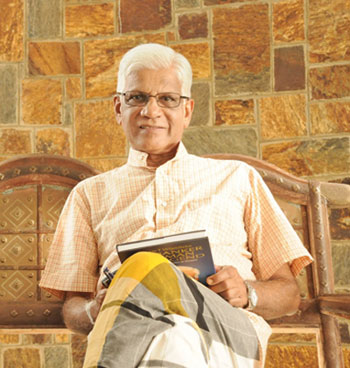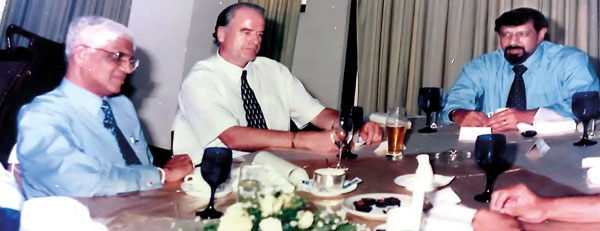Rienzie T. Wijetilleke – the visionary leader who rescued cricket

Pic courtesy Sandun Gamage
The cricketing world mourns the passing of Rienzie T. Wijetilleke, who died on the morning of Friday, July 4, at the age of 85. His death marks the end of an era in Sri Lankan cricket administration, as he was the visionary leader who rescued the sport from one of its darkest chapters and restored its credibility on the global stage.
In 1999, Sri Lankan cricket was engulfed in turmoil. The Board of Control for Cricket in Sri Lanka (BCCSL) had been plagued by corruption allegations that had lingered since the nation’s World Cup triumph in 1996. Matters came to a head when violence erupted at the Annual General Meeting in March 1999, leaving the board’s reputation in tatters both at home and abroad.
President Chandrika Kumaratunga responded swiftly. She dissolved the board and appointed the country’s first-ever Cricket Interim Committee to restore order. At its helm was Rienzie T. Wijetilleke, then Chairman of Hatton National Bank—a man renowned for his no-nonsense approach to discipline and accountability, despite his limited background in cricket administration.
“He was a strict disciplinarian with outstanding administrative skills,” recalled S. Skandakumar, who served under late Mr. Wijetilleke’s leadership at the board.
Wijetilleke’s appointment was bolstered by the calibre of the committee members: S. Skandakumar (the vastly experienced Honorary Secretary), Sidath Wettimuny, Michael Tissera, Ashantha de Mel (all respected former national cricketers), and Kushil Gunasekera. This blend of business acumen and cricketing insight proved to be the perfect recipe for reform.
The committee wasted no time in implementing tough but necessary changes. Sidath Wettimuny’s appointment as Chairman of Selectors was a clear indication that major reforms were in motion. After offering Arjuna Ranatunga the chance to step down gracefully as captain—a proposal he declined—Wettimuny and his selection panel, with the full backing of the interim administration, took the bold step of removing him and handing the captaincy to a young Sanath Jayasuriya. This decision underscored the administration’s commitment to meaningful transformation.
“Although he was not a cricketer he had a remarkable grasp of the game, respected the views of his cricketing colleagues, and supported meaningful changes that laid a strong foundation for the development of the game in the new millennium.
“High among them was accountability. It was a privilege to have served on that committee of cricketing gentlemen under his exemplary leadership,” Skanda further explained.
Understanding the need for experienced coaching, the committee made another pivotal decision: to reappoint Dav Whatmore, the architect of Sri Lanka’s 1996 World Cup triumph, who was then with the English county side, Lancashire. While attending the ICC Annual General Meeting at Lord’s in June 1999, S. Skandakumar successfully secured Whatmore’s return on a three-year contract beginning in August.
The results were immediate and emphatic. In Whatmore’s first month back, Sri Lanka won a triangular tournament featuring world champions Australia and India. This was followed by an even more momentous achievement: Sri Lanka’s first-ever Test series victory against Australia on home soil. It was Wettimuny’s mature judgement that ensured veterans Arjuna Ranatunga and Aravinda de Silva were included to help humble Steve Waugh’s formidable side.
Sanath Jaysuriya, the current Head Coach of the national team paid a glorious tribute to Mr. Wijethileke.
“He served as board Chairman during my captaincy and took excellent care of us. He was a genuinely kind and decent man who made a significant impact during his time in that role,” Jayasuriya said.
“One of his most meaningful contributions was creating job opportunities for many cricketers at the bank, which was tremendously helpful for their futures. His support was invaluable to me throughout my captaincy”.

Rienzie in a thoughtful mood with Tim Lamb CEO England and Wales Cricket Board at a lunch hosted at Seuart House by Skandakumar
So effectively had the interim committee restored Sri Lanka’s standing that the ICC entrusted the country with hosting the Under-19 World Cup, featuring 16 international teams. Under Kushil Gunasekera’s meticulous leadership, the tournament was conducted flawlessly, earning widespread praise from the ICC. The national team’s success continued with triumphant tours of Zimbabwe and Pakistan. Yet, despite these accomplishments, the interim committee stepped down in May 2000 after 12 months in office, due to differences with the then Sports Minister S.B. Dissanayake.
The passing of Rienzie T. Wijetilleke signifies more than just the loss of a cricket administrator; it marks the close of a chapter in which integrity and accountability were restored to Sri Lankan cricket through the tireless dedication of individuals who served selflessly. His legacy endures as a powerful reminder of what principled leadership and an unwavering commitment to the greater good of the sport can achieve.


